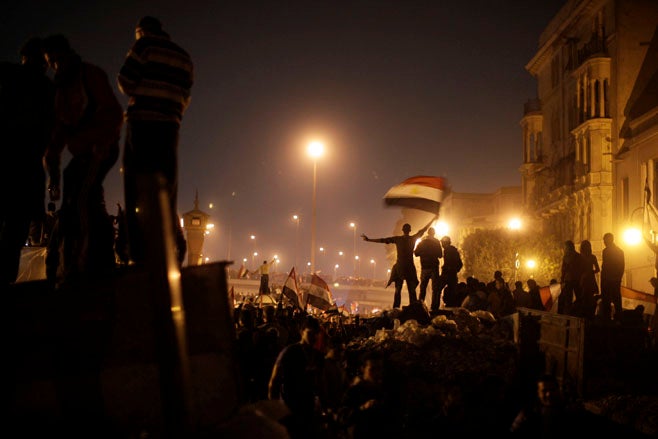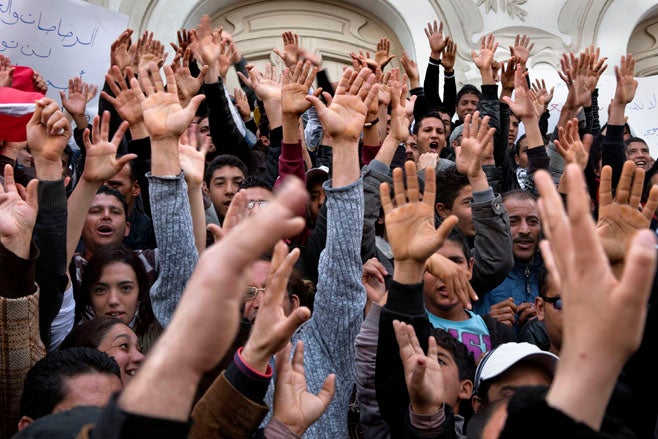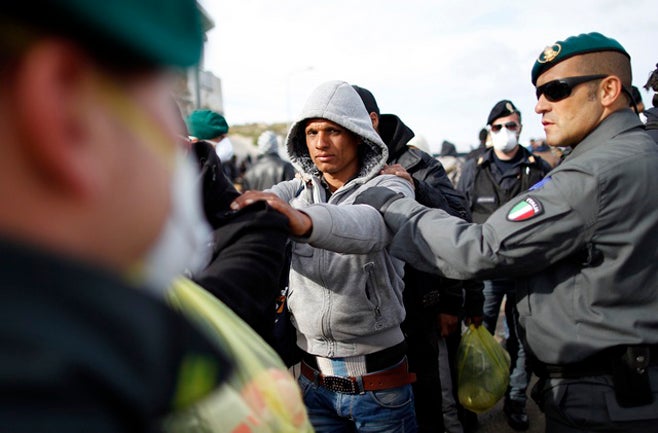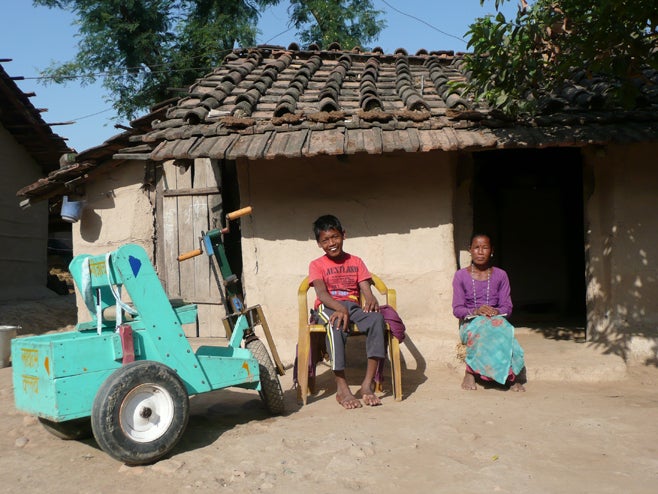In a referendum held in May 2011, President Rafael Correa obtained a popular mandate for constitutional reforms that could significantly increase government powers to constrain media and influence the appointment and dismissal of judges.
Those involved in protests in which there are outbreaks of violence may be prosecuted on inflated and inappropriate terrorism charges. Criminal defamation laws that restrict freedom of expression remain in force and Correa has used them repeatedly against his critics. Some articles of a draft communications law in the legislature since 2009 could open the door to media censorship.
Misuse of Anti-Terror Laws in Dealing with Social Protests
Prosecutors have applied a “terrorism and sabotage” provision of the criminal code in cases involving protests against mining and oil projects and in other incidents that have ended in confrontations with police. Involvement in acts of violence or obstructing roads during such protests should be ordinary criminal offenses. Yet Ecuador’s criminal code includes, under the category of sabotage and terrorism, “crimes against the common security of people or human groups of whatever kind or against their property,” by individuals or associations “whether armed or not.” Such crimes carry a possible prison sentence of four to eight years. In July 2011 the Center for Economic and Social Rights, an Ecuadorian human rights group, reported that 189 indigenous people were facing terrorism and sabotage charges. Most of them were in hiding and only eight had been convicted.
Accountability
Impunity for police abuses is widespread and those responsible for murders often attributed to a “settling of accounts” between criminal gangs are rarely brought to justice. In June 2010 a truth commission created by the Correa administration published a report documenting 68 extrajudicial executions and 17 enforced disappearances between 1984 and 2008, and named 458 alleged perpetrators of abuses. According to the commission, few of those responsible for the abuses had been held accountable, due to statutes of limitations, jurisdictional disputes, and procedural delays. In October 2010 the attorney general appointed a team of prosecutors to reopen investigations into cases reported by the commission. As of September 2011 the prosecutors were reported to have renewed investigations into several key cases, but no suspects had been charged.
Freedom of Expression
Ecuador’s Criminal Code still has provisions criminalizing desacato (“lack of respect”), under which anyone who offends a government official may receive a prison sentence up to three months and up to two years for offending the president. In September 2011 the Constitutional Court agreed to consider a challenge to the constitutionality of these provisions submitted by Fundamedios, an Ecuadorian press freedom advocacy group. A new criminal code presented by the government to the National Assembly in October does not include the crime of desacato, but if approved would still mandate prison sentences of up to three years for those who defame public authorities.
Under the existing code, journalists face prison sentences and crippling damages for this offense. According to Fundamedios, by October 2011 five journalists had been sentenced to prison terms for defamation since 2008, and 18 journalists, media directors, and owners of media outlets faced similar charges.
President Correa frequently rebukes journalists and media that criticize him and has personally taken journalists to court for allegedly defaming him. In July 2011 a judge in Guayas province sentenced Emilio Palacio, who headed the opinion section of the Guayaquil newspaper El Universo, and three members of the newspaper’s board of directors, to three years in prison and ordered them to pay US$40 million in damages to the president for an article the judge considered defamatory. In an opinion piece Palacios had referred to Correa as a “dictator” and accused him of ordering his forces to fire on a hospital, which was “full of civilians and innocent people,” during the September 2010 police revolt.
In September 2011 a three-person appeals court confirmed the prison sentence and the fine by majority vote. Correa said in a press conference that he would consider a pardon if the newspaper confessed that it had lied, apologized to the Ecuadorian people, and promised to be more “serious, professional and ethical” in the future.
In order to rebut media criticism the government has also used a provision of the broadcasting legislation that obliges private broadcasters to interrupt scheduled programs to transmit government messages known as cadenas. According to an independent media observation group, between January 2007 and May 2011, there were 1,025 cadenas totaling 151 hours of broadcasting time, many of which included attacks on government critics.
Legislation to regulate broadcasting and print media has been under congressional debate since 2009. In the May 2011 referendum voters supported, by a small majority, a proposal to create an official council to regulate the content of television, radio, and print media. Proposals by six ruling party legislators under discussion in the National Assembly in July 2011 would grant broad powers to this council, allowing it to punish media that disseminate “information of public relevance that harms human rights, reputation, people’s good name, and the public security of the state,” terms so vague that they could easily lead to sanctions against critical outlets.
Judicial Independence
Corruption, inefficiency, and political influence have plagued the Ecuadorian judiciary for many years. Correa’s efforts to reform the system could lead to a significant increase in the government’s influence over the appointment and dismissal of judges. Voters in the May 2011 referendum approved a proposal to dissolve the Judicial Council, a body composed of independent jurists responsible for the selection, promotion, and dismissal of judges, whose efficiency had been widely questioned. It was to be replaced for 18 months by a tripartite transitional council to be appointed by the president, the legislature (in which Correa has majority support), and the “Transparency and Social Control Function,” the citizens’ branch established in the 2008 Constitution. This transitional council dismissed scores of judges in August and September 2011.
Also approved in the referendum was a constitutional reform giving the executive branch and its appointees a direct role in a new judicial council that would eventually replace the one dissolved. One of the new council’s five members would be chosen by the executive; its other members would include the attorney general and the public defender.
In September 2011, at the request of the transitional council, Correa declared a “state of emergency in the judicial branch,” to resolve the “critical situation” of the justice system. The decree declared a “national mobilization, especially of all the personnel of the judicial branch.” Lack of clarity about the meaning of “mobilization” could threaten judges’ independence by suggesting they must get behind government goals or risk dismissal.
Human Rights Defenders
The Correa administration has proposed to tighten regulations regarding the operation of both domestic and international NGOs in the country, including those working on human rights and the environment. In a draft decree announced in December 2010, domestic NGOs, including those working on human rights, would have to re-register and submit to continuous government monitoring. The decree would give the government broad powers to dissolve groups for “political activism,” and “compromising national security or the interests of the state,” ill-defined terms that could seriously compromise NGOs’ legitimate activities. At this writing the proposed decree had not been adopted.
Another presidential decree adopted in July 2011, regulating international NGOs with offices in Ecuador, allows the government to monitor all their activities and rescind their authorizations if they engage in activities different from those described in their application, or “attack public security and peace.” In August the government announced it planned to halt the operations of 16 foreign NGOs because they had failed to provide information about their activities.
In a radio broadcast in June Correa accused Fundamedios and another NGO, Participación Ciudadana (Citizen Participation), of trying to destabilize his government, and questioned their alleged receipt of funds from foreign donors. In response to a statement by Fundamedios pointing out that its receipt of foreign funding complied with the law, the communications secretary accused NGOs of implementing “political strategies and military tactics aimed at creating confusion or promoting currents of public opinion favorable to the interests of some of their funders.”
Key International Actors
In August 2011 the Inter-American Commission on Human Rights filed a case accusing Ecuador of violating the right to due process of 27 Supreme Court justices who were arbitrarily dismissed by Congress during a constitutional crisis in 2004.
In October 2011 the Inter-American Commission on Human Rights held a thematic hearing on freedom of expression in Ecuador. Addressing the ongoing use of criminal libel laws to prosecute people for criticizing public authorities over matters of public interest, the commission noted that the protection of reputation in such cases must be guaranteed only through civil sanctions. The commission also expressed its “deepest concern” at a government broadcast (which all television and radio stations had to air) seeking to discredit Fundamedios, whose representatives had testified at the hearing.






